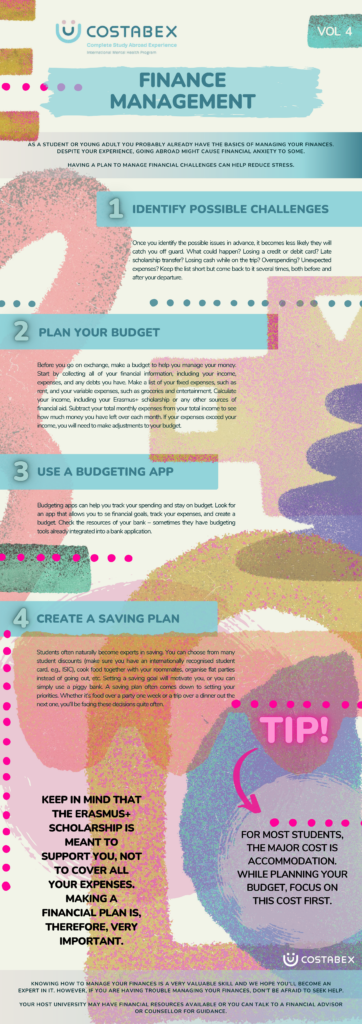As a student or young adult you probably already have the basics of managing your finances. Despite your experience, going abroad might cause financial anxiety to some. Having a plan to manage financial challenges can help reduce stress.
- Identify possible challenges
Once you identify the possible issues in advance, it becomes less likely they will catch you off guard. What could happen? Losing a credit or debit card? Late scholarship transfer? Losing cash while on the trip? Overspending? Unexpected expenses? Keep the list short but come back to it several times, both before and after your departure. - Plan your budget
Before you go on exchange, make a budget to help you manage your money. Start by collecting all of your financial information, including your income, expenses, and any debts you have. Make a list of your fixed expenses, such as rent, and your variable expenses, such as groceries and entertainment. Calculate your income, including your Erasmus+ scholarship or any other sources of financial aid. Subtract your total monthly expenses from your total income to see how much money you have left over each month. If your expenses exceed your income, you will need to make adjustments to your budget. - Use a budgeting app
Budgeting apps can help you track your spending and stay on budget. Look for an app that allows you to set financial goals, track your expenses, and create a budget. Check the resources of your bank – sometimes they have budgeting tools already integrated into a bank application. - Create a saving plan
Students often naturally become experts in saving. You can choose from many student discounts (make sure you have an internationally recognised student card, e.g., ISIC) or cook food together with your roommates. Setting a saving goal will motivate you, or you can simply use a piggy bank. A saving plan often comes down to setting your priorities. Whether it‘s food over a party one week or a trip over a dinner out the next one, you‘ll be facing these decisions quite often.
Keep in mind that the Erasmus+ scholarship is meant to support you, not to cover all your expenses. Making a financial plan is, therefore, very important.
TIP. For most students, the major cost is accommodation. While planning your budget, focus on this cost first.
Knowing how to manage your finances is a very valuable skill and we hope you‘ll become an expert in it. However, if you are having trouble managing your finances, don’t be afraid to seek help. Your host university may have financial resources available or you can talk to a financial advisor or counsellor for guidance.

